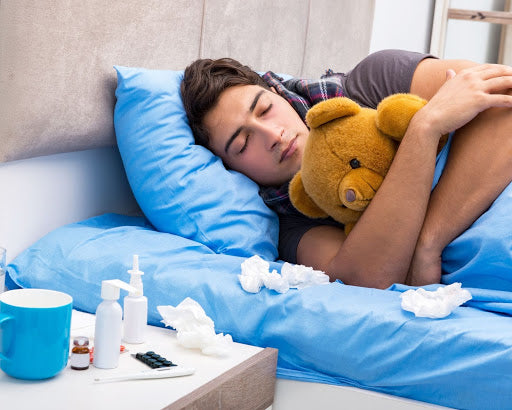Flu season is upon us, which means that getting your flu vaccine and regularly washing your hands are two things that should be on your to-do list. While these precautions help keep the hospitals clear to treat COVID-19 patients, they’re critical for adults suffering from obstructive sleep apnea.
Why? A recent study performed by the American Academy of Sleep Medicine found that sleep apnea patients who do not use continuous positive airway pressure (CPAP) therapy have a greater risk of being hospitalized with the flu.
The Connection Between Sleep Apnea and Influenza
Do you have obstructive sleep apnea (OSA)? If so, you’re not alone. Nearly 30 million adults in the United States have been diagnosed with sleep apnea, which causes their airways to collapse throughout the night, making it difficult for the patient to breathe.
Many adults with sleep apnea rely on CPAP therapy to provide continuous air pressure through a face mask. This constant pressure allows the patient’s airway to remain open while they sleep — preventing them from having cessations in their breathing.
A recent study found that those with OSA who did not use CPAP therapy had an increased chance of being hospitalized because of influenza. 61% of patients who did not undergo CPAP therapy to improve their sleep apnea symptoms found themselves being hospitalized when diagnosed with the flu compared to 24% of sleep apnea patients who regularly used CPAP treatment nightly.
The study suggests that while those not using CPAP therapy did receive a flu shot, their response to the vaccine might not have been as strong because they had a poor sleep. With a combination of continuous positive airway pressure therapy and the flu vaccine, patients with sleep apnea are much less likely to be hospitalized for influenza.
What Should Those with Sleep Apnea Do?
The first preventative measure to fight influenza an adult with sleep apnea should take is to get the flu shot — especially in today’s world where we are also fighting against COVID-19. While the flu vaccine isn’t 100% effective, it’s been shown to reduce the risk of contracting the flu significantly, and it’s more damaging strains.
Nowadays, the flu vaccine is readily available and covered by most insurance policies, making it easy for any sleep apnea patient to receive one at their convenience. Along with scheduling a flu shot, adults with OSA should also be diligent about disinfecting their belongings and washing their hands to reduce the spread of germs.
As mentioned above, the study showed that the flu vaccine wasn’t as effective on patients that weren’t getting a good night’s sleep. When suffering from sleep apnea, the patient must be compliant with CPAP therapy, allowing them to breathe continuously throughout the night — helping them feel well-rested the next day and strengthening their immune system. This will enable them to fight off illnesses more effectively.
Testing and Treatment for Obstructive Sleep Apnea
Apnea Med offers a fast and affordable home sleep study that can be self-administered at the patients’ homes if you suspect you have sleep apnea. This study will monitor and record their blood oxygen levels, blood oxygen saturation, and breathing and heart rates to gather vital information that one of ApneaMed’s board-certified sleep physicians can review.
The most common form of treatment for obstructive sleep apnea is CPAP therapy, which will provide continuous airway pressure while you sleep — helping you breathe continuously throughout the night and strengthen your immune system to help you fight off influenza.
If you have any questions about ApneaMed’s at-home sleep apnea test or our sleep apnea treatment equipment, contact our team to learn more.

